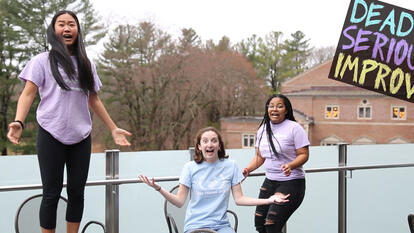
From Dead Serious to John Oliver: The Comedy Journey of the Emmy-Nominated Ali Barthwell ’10
A career in comedy may have seemed like an obvious choice to those who knew Ali Barthwell ’10 at Wellesley, where she was a co-president of the improv group Dead Serious and gained notoriety for her hilarious contributions to every thread on the FirstClass message board Community. But apparently that was not so for her parents. “My parents are both doctors, so they were like, ‘What the––?’” she said.
Even Barthwell, now a staff writer for Last Week Tonight with John Oliver, wasn’t sure about what she wanted to do. It was only when she was home in Chicago on break during college and saw a show by The Second City, the legendary improv empire that was once the home of Gilda Radner, Tina Fey, and Keegan-Michael Key, that it all clicked for her: “I want to do that!”
Writer and actress Amber Ruffin was part of the Second City Mainstage at the time, and Barthwell was captivated. “The things she was saying, I related to,” Barthwell remembers thinking, “and I began to wonder: How do I get to do that? Maybe people will relate to the things I say, too.”
Breaking into the world of comedy is anything but straightforward, but Barthwell figured that Second City was a good place to start. She learned about a Second City scholarship for comedians of color, sponsored by Puma, and applied. Barthwell enlisted a Wellesley pal to film a Dead Serious show for auditions, and she had a friend who was a studio art minor take her first headshots. During senior week in May 2010, she flew back to Chicago for a call-back audition. Barthwell got the scholarship.

“The scholarship showed my parents that there are people out there who believe I can do this,” Barthwell said. It also gave her the opportunity to study and perform at Second City right out of Wellesley. Barthwell took dozens of classes and threw herself into writing sketches, directing, and performing. She did shows at bars and festivals, sometimes performing for only 10 people in a mostly empty space, but she logged the hours and found she was getting better and better at her craft.
“When you start performing, you are doing an impression of a performer you admire,” Barthwell said. “I would watch other comedians and be like, ‘Oh, I can tell you like Chris Farley, or you like Will Ferrell.’ At first, I was just trying to do an impression of Amber Ruffin.” After multiple auditions, she finally got into the Second City conservatory. Barthwell then completed Second City’s HouseCo program, then toured with and later directed for its RedCo program. The more hours she spent on stage, the less Barthwell felt like she was doing an Amber Ruffin impression and the more she felt she was just being herself.
Barthwell said she has learned to apply the “Yes, and” philosophy of improv to her life: Always be open to other people’s ideas. She also feels improv has helped her try new and different experiences.
“Improv teaches you how to brush things off,” she said. “You just have to do this scene once, and then it will never exist again.” She keeps in mind that any new job or experience she takes on doesn’t have to be forever—she can try it out and move on if it doesn’t feel right. In addition to performing and directing with Second City, Barthwell has also worked for Cards Against Humanity, taught improv at Second City and Columbia College, and written (and continues to write) The Bachelorette recaps for Vulture.
“I never thought to myself, if I don’t get onto SNL by the end of the year, I am going to walk into the lake,” Barthwell said. She said she always tries to identify the kind of work she wants to do rather than any one specific job. “I want to be somewhere where my point of view is valued, my voice is allowed to come through and be featured, and where I get to share part of myself,” she said. “It’s also just as helpful to figure out the places you don’t want to be.”
“I want to be somewhere where my point of view is valued, my voice is allowed to come through and be featured, and where I get to share part of myself.”
Ali Barthwell ’10
Barthwell hadn’t planned to write for television, but she applied to write for Last Week Tonight last year, and she began working for the show in summer 2020. She is especially proud of two clips in particular: One was a joke about Elmo’s mom having Black hair that appeared in the segment on unemployment, and the other was the segment about Black hair that went viral. In both instances, many Black women related to the jokes and reposted them (including actress Kerry Washington, who called out Barthwell by name). Barthwell began to see others relating to what she was saying just as she had related to Amber Ruffin’s material in that first Second City show.
“Any place that hires Black writers should want them to bring their full self and to bring the knowledge and the specific references they have,” Barthwell said. The Last Week Tonight team has allowed Barthwell to do just that: “In a lot of places I’ve worked, I have had to mitigate who I am, make things palatable and understandable to a white audience, and now I’m in a place where they are saying we want this full specificity, full depth of your experience.” And clearly this has worked out well for the Last Week Tonight team: Barthwell and her colleagues were recently nominated for an Emmy for their work on season 7, Barthwell’s first season writing for the show.
Often in her career Barthwell has found herself as the first or the only: At Second City, she was the first Black woman to complete the HouseCo program and the first Black director at her level, and now she is the only Black woman writing for John Oliver. Barthwell’s advice for others who find themselves in this position is to remember that they got the job for a reason—“Even if someone tries to make you feel weird about it!” She said she reminds herself that she should be confident in her work, and that she can’t and shouldn’t try to speak for all Black women, even if others might pressure her to try. “I can’t write a joke about every Black woman ever, but I know I can write a joke about my experience as a Black woman,” she said. “You can be a spokesperson for yourself, and by doing so, you expand the room a little bit more for whoever comes after you.”
“Plus, being able to exploit it a little bit is fun,” Barthwell said, laughing. “Like when I was at Second City, if I wrote a scene about race, I knew it was probably going to make it in.”


